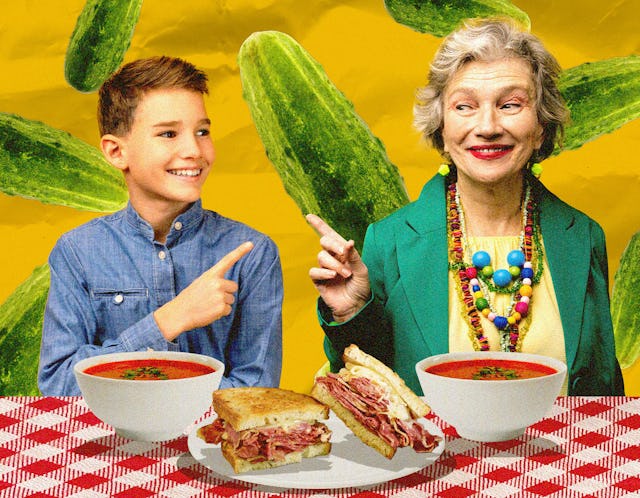You Can Ask Your Grandma Things You'd Never Ask Your Mom
Grandparents can play a special role in their grandkids’ lives, because they have a freedom that parents don’t.

“Mima, how do you say f*ck in Yiddish?” my 13-year-old cheekily asks my mom (his grandma) over bowls of tomato soup.
My mom immediately picks up the mantle of this question with great seriousness and begins to think out loud about which word for f*ck might fit the bill. One might wonder why such deliberation was necessary. Still, Yiddish is a language that has many words for one thing, each with its own nuance — the situation, the intonation, the level of humor.
My son and mother batted back and forth a variety of options — him offering up one he’d heard from an aunt, her explaining why that word for f*ck wasn’t quite right — they then veered down the path of exploring the many, many words for penis in Yiddish. Lunch ended with the two of them giggling and my mom promising to check her Joys of Yiddish when she got home. In case you’re wondering, they eventually landed on the word schtup, but neither of them is still entirely convinced that’s the right word.
Some of you may be reading this aghast. How inappropriate! The profanity! Sure. Fine. But the point is this: grandparents can play a special role in their grandkids’ lives, because they have a freedom that parents don’t. My mom isn’t worried about what happens if my kid goes to school on Monday and starts using the word schtup in class; she’s not bothered if he then gets a detention and has to stay late at school and misses the bus home, and she doesn’t have to deal with the email exchange from his teacher later that night about his using inappropriate language in school. She simply gets the pleasure of batting back and forth some funny, dirty words over yummy soup.
A love of words and language is woven into my family’s DNA. I have incredibly fond (and not so fond) memories of playing Scrabble with my mom and my own Nana. They are those maddening Scrabble players who know words like QUA and put them on the triple word score square — at that point; the game is as good as over. As I got older, I was better able to enjoy the experience of playing with them, looking out to protect the triple word score before the matriarchal vultures swept in. And when my daughter became old enough, she began playing with us as well, a new dawn of cut-throat competitor shamelessly edging out her 100-year-old great-grandma.
That was the very same Nana with whom, as an adult, I had a private book club sharing Regency romance novels over several years. Books my mother would never have read but my Nana and I devoured and dissected together. When she was done with them, she would pack them up into shopping bags and wait for me to donate them to my library, deemed too indecent to donate to her nursing home’s library. Our two-person book club didn’t materialize from thin air — our connection was forged over many years of playing dominoes and gin rummy across her game table. She and I shared moments, mundane and special, completely separate from my mom and her daughter, and charted a course of our own over the following decades.
My own parents have created rituals with my kids: chocolate chip pancakes at the local greasy spoon, birthday outings to a museum and birthday gift shopping, and driving lessons in empty parking lots when they came of age. These times together happened without me there to intercede, correct their table manners, or answer questions for them. These moments gave my kids and my parents the freedom to develop their own relationships without an intermediary, just as I did with my Nana.
Was it all perfect? No.
Did my kids sometimes come home with a bellyache from too much cake? Sure.
Did my dad tell my oldest about Hitler before we were ready to talk about the Holocaust? Yup.
But there was so much good that came of them, too. Inside jokes that set my mom and my kids into giggles, butterfly kisses on their cheeks and raspberry zerberts on their bellies when they were little, text exchanges after a big game, and worry for the outcome of an exam when they grew older. And yes, sometimes grandparents say things they shouldn’t, offering insights when they’re not welcome or opining on topics that feel private to kids. But that’s the price any of us pay for close connection with another person — mistakes, trespasses, clumsiness — it doesn’t make the benefits any less valuable. The ultimate gift is that my kids have more loving adults looking out for them, cheering them on, checking in on how they are — a treasure I will never take for granted.
When I was a kid, my Nana took me for chili dogs and root beer on my birthday. When she was too old to leave home, it became ice cream sundaes in her nursing home with me and my kids. The guilty pleasures between my parents and my kids might taste different, and there’s definitely more profanity involved, but while the indulgences changed, a constant thread continued. From generation to generation, tiny moments of connection translate into expansive expressions of love.
Vanessa is the co-author of the bestselling This Is So Awkward: Modern Puberty Explained, co-host of The Puberty Podcast, and President of Content at Order of Magnitude, the leading brand dedicated to flipping puberty positive.